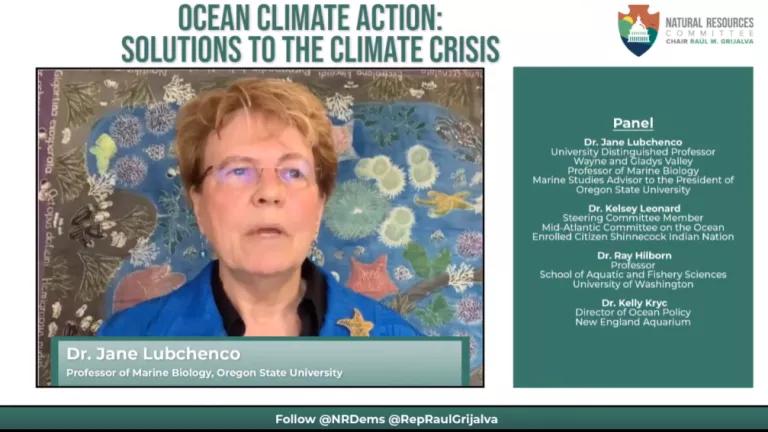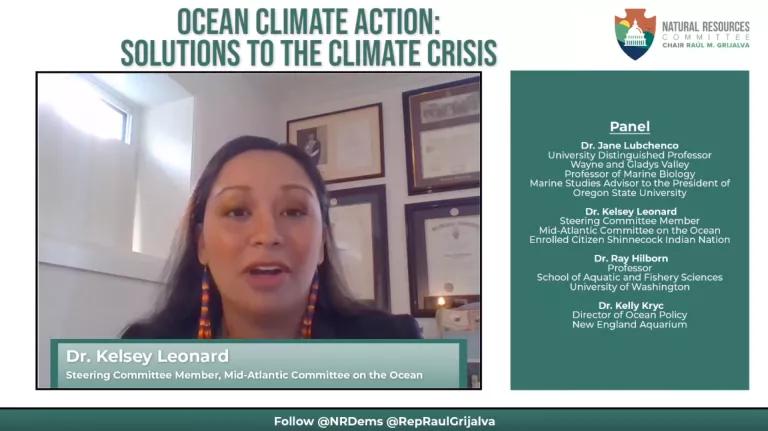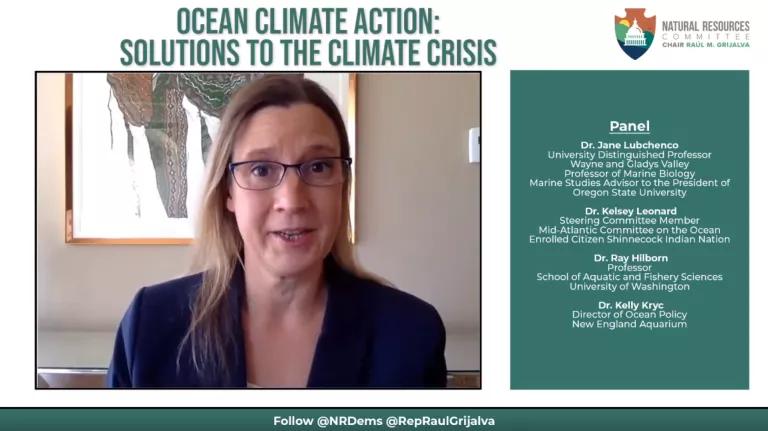Congress Takes Up Ocean Climate Action
The House Natural Resources Committee has begun tackling the monumental Ocean-Based Climate Solutions bill, H.R. 8632.

The House Natural Resources Committee has begun tackling the monumental Ocean-Based Climate Solutions bill (H.R. 8632). The first of its kind to address the ocean side of climate change, the bill sets a truly exciting precedent for ocean climate action legislation. The hearing addressed blue carbon, the ban on offshore drilling, the need for marine protected areas, the pathway for expanding offshore wind, and more.
The Ocean-Based Climate Solutions bill promotes resilience and justice for U.S. territories, Indigenous peoples, and communities of color. The fifteen titles of the bill address a broad swath of ways the ocean is part of the climate solution. Chairman Grijalva highlighted the bill’s plan to protect 30% of the ocean by 2030, saying it:
“is good for everybody. A new study finds that expanding existing global marine protected areas by just 5% would improve future fisheries catch by at least 20%.”(emphasis added)
This is exactly the type of legislation the United States needs for the future of both people and the planet.
Members of the House Natural Resources Committee care about this new legislation—there was strong turnout by the Committee, including Reps. Huffman, Bonamici, Cartwright, Soto, Barragan, Tonko, Garcia, Beyer, Haaland, Lowenthal, and Levin.
Dr. Jane Lubchenco, former NOAA Administrator and current professor, spoke to the multiple crises our nation faces—the current COVID-19 pandemic, the resulting economic situation, the biodiversity crisis, and the climate crisis—and how bills like this one can help us address multiple crises at once. In her written testimony, Lubchenco shared that, “this is not a time for timid action, nor for piecemeal solutions,” saying this bill provides hope and a needed pathway to address climate action. Lubchenco shared in her testimony:
“It is high time for ocean actions to be appreciated for the significant power they provide as solutions. The ocean connects and sustains us. It is our past and our future. When we pay attention to the ocean, people win, the economy wins, and nature wins.”
Dr. Kelsey Leonard, assistant professor, member of the Mid-Atlantic Committee on the Ocean, and enrolled citizen of the Shinnecock Indian Nation, spoke on the critical need to fully engage Indigenous Peoples to meet the goals and policies laid out in the Ocean-Based Climate Solutions act. She spoke to urgency of acting on climate and the opportunity to invest more fully in nature-based solutions grounded in Indigenous knowledge systems.
“I believe the whale is, like a miner’s canary, a foreboding and sacrificing alarm of our current climate crisis, and the need to take immediate action—not only for their protection, but for the planet.”

Dr. Kelly Kryc, director of ocean policy at the New England Aquarium, spoke to the offshore wind pieces of the bill as well as marine mammals, blue carbon, and the need to protect 30% of the ocean by 2030. She deftly connected marine mammal conservation and climate change, outlining the multiple benefits of vessel speed reductions in limiting emissions, moderating underwater noise, and reducing the lethality of collisions with endangered marine mammals like the North Atlantic right whale. Dr. Kryc reminded us that what we do to the ocean affects those who live at the coast as well of those who live well inland, and that all of us need to be invested in the health of our oceans.
“The ocean’s reach extends far beyond the coasts. It is responsible for controlling weather patterns that determine precipitation for farms and ranches in Oklahoma, prolonged droughts in Colorado, and flooding in Missouri.”

The House Natural Resources Committee’s engagement on this comprehensive legislation signals the importance of this bill. It has set the marker on what ocean climate action looks like. We are grateful to the members of the House Natural Resources Committee, the scientists who testified, and all the cosponsors of this bill, which offers solutions to so many of the crises we face. Almost 160 organizations representing millions of members signed this letter in support of this bill and ocean climate action.
As Rep. Grijalva reminds us,
“We are in reciprocal relationship with nature. You reap what you sow. But with solutions like this legislation and other proposals to confront climate change, we can, and will, do better.”



